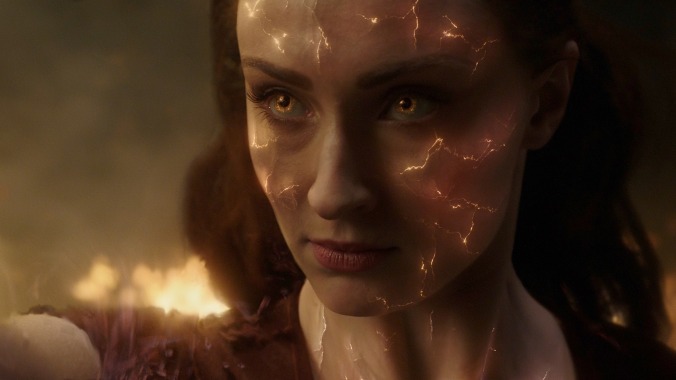Simon Kinberg says Dark Phoenix was never supposed to be "a classic superhero movie"

It’s likely that no big-budget would-be blockbuster this year is going to draw a more exhaustive series of post-mortem than Simon Kinberg’s Dark Phoenix, the film that ended Fox’s long-running X-Men franchise not with a mutant-powered bang, but with a definitive box-office whimper. Say what you like about Kinberg, though: He’s not afraid to be right in the middle of dissecting all the things that went wrong with the film’s troubled and extended production, from its shifting release dates, to its re-shoot issues, to the woes that happened when vast swathes of Fox’s marketing team got laid off right when they were meant to be promoting it.
In an interview today with KCRW’s The Business, though, Kinberg doesn’t try to pass the buck: He owns that, as a writer-director-producer, the film was ultimately his responsibility.. “I’m the writer-director, the movie didn’t connect with audiences, that’s on me,” he told reporter Kim Masters. That being said, he did acknowledge that the film’s release date—which was moved from November, to February, and finally to earlier this month—did no favors to the kind of movie he intended to make. “It wasn’t made as a classic superhero movie,” he contended. “It was made as more of a dramatic, intimate, smaller film.” (Albeit, it goes unsaid, one with a whole bunch of gigantic space explosions.)
Masters pushed Kinberg on a whole bunch of aspects of the oft-worrisome X-Men franchise, from its various restarts and stutters, to the elephant in the room: Frequent on-again off-again director Bryan Singer. During the conversation, Kinberg swears he’s not just being “diplomatic” when he describes Singer—whose reported tendency to ditch out on sets, leaving others to finish films like last year’s Bohemian Rhapsody, has become well-known in recent years—as being a fan of a “collaborative” process. Kinberg also addressed the numerous allegations of sexual assault against Singer over the years, noting that it was “Not something that I saw on set or in the workplace. Otherwise I would have felt like it was my business.”
Sadly, Masters did not ask Kinberg about rumors—spread by his own cast—that the film’s ending had to be scrapped because it was too much like “another superhero movie.” (Widely speculated to have been Captain Marvel.) In terms of crossovers, though, mentioned that he did get a very sympathetic note from Deadpool director Tim Miller about the movie’s box office performance:
He wrote me an email having empathy for a movie that doesn’t work. [He wrote] people will come to see the movie differently, and out of the context of this particular moment, see things in it they will appreciate and that he appreciated as a fan.
Dark Phoenix opened last weekend to the worst domestic numbers in franchise history; per Deadline, it’s expected to lose something like $100 million when all is said and done. It’s not clear whether an opening in November—a “more contemplative time,” in Kinberg’s words—would have done much to change that, but hey, at least the movie has one fan: “I actually really like the movie,” Kinberg asserted. “I had an amazing time making it.”